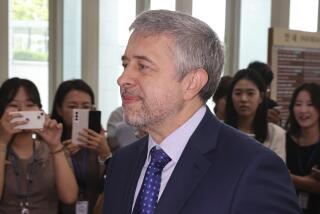China Letting N. Korean Defectors Leave
- Share via
BEIJING — The Chinese government said today that it had reached an agreement to avert a diplomatic crisis after 25 North Korean defectors stormed into the Spanish Embassy here and threatened to commit suicide if the international community did not help them escape to South Korea.
Sources in South Korea said the defectors would be sent later today to a third country, which was not identified but was believed to be the Philippines, and from there would be flown to Seoul.
The South Korean news agency Yonhap reported that the defectors would reach Seoul on Sunday. The group includes 11 children, the youngest a 7-year-old girl, and was reported to have left the embassy grounds today.
Chinese Premier Zhu Rongji told reporters at a televised news conference this morning that “China’s Foreign Ministry has consulted with the relevant embassy and has reached agreement with them. This matter will be handled in accordance with law.”
In a dramatic bid for international sympathy, the North Koreans on Thursday stormed into the lightly guarded Spanish Embassy, waving and cheering to television crews who had been tipped off in advance.
“Some of us carry poison on our person to commit suicide if the Chinese authorities should choose once again to send us back to North Korea,” said a statement issued on behalf of the defectors by the Tokyo-based Life Funds for North Korean Refugees, a private assistance group. “The only power we have left is to appeal to you on our knees with tears.”
It is estimated that at least 100,000 North Koreans and possibly as many as 400,000 have escaped their famine-stricken homeland into China, where they live and work clandestinely, in fear of being sent home. Human rights advocates say repatriated defectors are put in concentration camps, tortured and often executed.
China does not recognize North Korean defectors as refugees. It honors a 1961 repatriation agreement with North Korea to send them home instead of United Nations conventions on refugees. In addition, China restricts the South Korean Embassy in Beijing from offering direct assistance to North Korean defectors, who are forced to go to third countries, such as the Philippines, Mongolia or Vietnam, before they can reach South Korea.
“Their entry into the Spanish Embassy can only be regarded as an illegal entry,” Chinese Foreign Ministry spokeswoman Zhang Qiyue said.
The plight of the North Korean defectors puts China in a tricky position. Although Beijing has historically considered its relationship with the regime in Pyongyang, the North Korean capital, to be as close as “lips and teeth,” the Chinese side has recently sought to distance itself slightly from its neighbor and to encourage a rapprochement on the Korean peninsula. Also, Beijing does not want to alienate Western opinion by returning the defectors to the repressive conditions in their home country, especially just before a U.N. meeting on human rights is due to convene in Geneva.
In Washington, State Department spokesman Richard Boucher said Thursday that the defectors should not be sent home.
The incident was the second time within a year that North Korean refugees have sought asylum inside a foreign mission in Beijing. In June, a family of seven dashed into the Office of the U.N. High Commissioner for Refugees here in the Chinese capital and remained holed up inside for three days. In a face-saving deal, the Chinese government allowed the family members to leave Beijing on medical grounds for Singapore and the Philippines, from which they eventually went on to South Korea.
But the latest group is the largest to have pulled off such a feat and its apparent success raises the possibility of a new flood of North Korean refugees. A record 583 North Korean defectors were resettled in South Korea in 2001, nearly double the number from a year earlier. So far this year, 106 defectors have reached South Korea, including 18 whose arrival was announced today by the Seoul government.
“North Korea is a giant prison without bars,” declared a 45-year-old dental assistant identified as Yu Dong Hyok, one of the defectors, in a statement released by human rights advocates. He and others in the group of 25 said they had tried last year to escape into China but were caught and sent back. The North Koreans described harsh labor camps where failed defectors were beaten, tortured, raped, executed or simply worked to death.
“We were not human beings there. We were less than beasts,” Yu said.
*
Demick reported from Seoul and Chu from Beijing. Times staff writer Mark Magnier in Tokyo contributed to this report.
More to Read
Sign up for Essential California
The most important California stories and recommendations in your inbox every morning.
You may occasionally receive promotional content from the Los Angeles Times.














